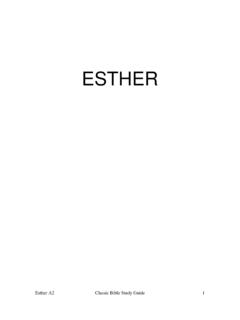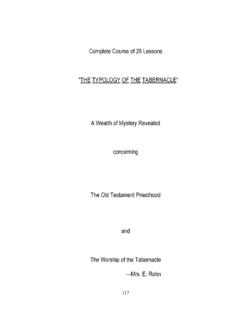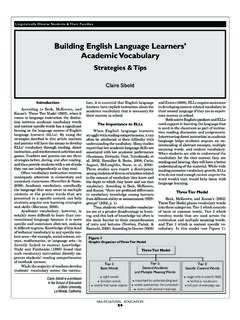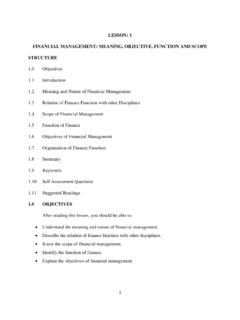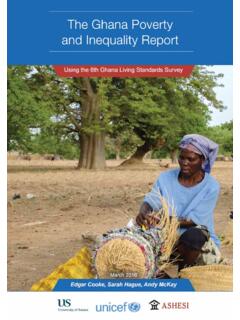Transcription of ECCLESIASTES - Bible Commentary, Bible Meaning
1 ECCLESIASTES A2 Classic Bible Study Guide 1 ECCLESIASTES ECCLESIASTES A2 Classic Bible Study Guide 2 INTRODUCTION The Book of ECCLESIASTES gives every evidence of being a carefully composed literary essay that must be grasped as a totality before it can be understood in part. The content of the book is defined by nearly identical verses (1:2; 12:8), which circumscribe the book by anticipating and by summarizing the conclusions of the author. The theme is set forth in 1:3: "What profit has a man from all his labor in which he toils under the sun [that is, in this life]?" Or, can true wisdom be found by a human being apart from revelation from God? The Preacher's quest is for some sort of fixed, unchanging value ("profit") that can be found in this life ("under the sun") that can serve as a basis for proper living.
2 The Hebrew word translated "profit" is yitron (1:3), and may also be translated "gain, value." "Vanity" is a key word in the book, translating the Hebrew hebel (literally, "breath"), thus indicating what is mortal, transitory, and of no permanence. As he tries each of the avenues proposed by humanity to achieve the value being sought, he finds them elusive ("grasping for the wind") and fleeting, transitory ("vanity"). The "wisdom" of 1:12-18 is found bankrupt of real value. Neither is the answer to be found in pleasure, in wealth , in great accomplishments (2:1-11), in a doctrine of retribution (2:12-17), or in materialism (2:18-26). If neither accomplishments nor things are yitron, what then should be one's attitude toward them, seeing they have no permanent value? The answer introduces the secondary theme of the book: one should enjoy both life and the things with which God has blessed him (3:11, 12; 5:18-20; 9:7-10), remembering that in the end God will judge him for the way this is done (11:7-10).
3 Even human life itself, in any secular, humanistic sense, cannot be the yitron the Preacher seeks. The interplay of death and life is also a subordinate theme for the book. But returning to the Preacher's grand quest: is it destined to conclude (12:8), as it began (1:2), on a note of despair? The Preacher's constant probing of all existence for Meaning shows him to be an optimist, not a pessimist, and his failure to discover any absolute, abiding value in this life ("under the sun") does not mean his quest is a failure. Instead, he finds himself compelled (by his observation that God placed order in the universe at the time of its creation, 3:1-14) to seek the value he seeks in the world to come (not "under the sun" but "above the sun," so to speak). Although he does not specifically state it as such, the logic that undergirds his entire quest compels him to find the only real yitron in the fear (reverence) and obedience of God (11:7-12:7).
4 This is affirmed in the epilogue: reverence for God and keeping His commandments are the whole duty of mankind (12:13). This duty must be carried out in full knowledge that, while there is no real justice to be had in this life, God will eventually judge all that is and set it right (11:9; 12:14). On this profound note the book concludes. (Spirit Filled Life Bible s Introduction to ECCLESIASTES , William C. Williams) ECCLESIASTES A2 Classic Bible Study Guide 3 ECCLESIASTES 1:1-18 Solomon had dived into nature's depths (1 Kings 4:33), and he had it, more of it perhaps than ever any man had. He spoke in God's name, and was divinely inspired to say it, deliberately, and laid it down as a fundamental principle, on which he grounded the necessity of being religious. One main thing he intended was to show that the everlasting throne and kingdom must be of another world; for all things in this world are subject to meaninglessness, and therefore have not in them sufficient to answer the extent of that promise.
5 What does a man gain from all his labor? v. 3. The business of this world is labor; the word implies both care and toil. It is work that wearies men. What does a man gain from all his labor? Solomon says (Prov. 14:23), All hard work brings a profit; and yet here he denies that there is any profit. As to our present condition in the world, it is true that by labor we get that which we call profit; we eat the labor of our hands; but here he determines that it is not a real benefit. In short, the wealth and pleasure of this world, if we had ever so much of them, are not sufficient to make us happy. As to the soul, and the life that is to come, we may much more truly say. What does a man gain from all his labor? All he gets by it will not supply the wants of the soul, will not atone for the sin of the soul, nor cure its diseases.
6 To prove the meaninglessness of all things under the sun Solomon here shows the time of our enjoyment of these things is very short. We continue in the world but for one generation, which is continually passing away to make room for another, and we are passing with it. While the stream of mankind is continually flowing, how little enjoyment has one drop of that stream of the pleasant banks between which it glides! We may give God the glory of that constant succession of generations, but as to our own happiness, let us not expect it within such narrow limits, but in an eternal rest and consistency. It is well for mankind in general that the earth endures to the end of time, when it and all the works in it shall be burned up; but what is that of spirits? Man remains on the earth but a little while.
7 He made it his business to acquaint himself with all that is done under heaven, that is done by the providence of God or by the skill and prudence of man. Though he was a prince, he made himself a drudge to learning, was not discouraged by its knots, nor did he shrink from its depths. And this he did not merely to gratify his own genius, but to qualify himself for the service of God and his generation, and to make an experiment how far the enlargement of the knowledge would go towards the settlement and repose of the mind. He saw all the things that were done under the sun (v. 14), works of nature in the upper and lower world, works of art, the product of men's wit, in a personal or social capacity. He had as much satisfaction in the success of his searches as ever any man had. Solomon must be acknowledged a competent judge of this matter for he had not only got his head full of notions, but he experienced much of wisdom and knowledge, of the power and benefit of knowledge, as well as the entertainment of it; what he knew he had digested, and knew how to use.
8 So industrious was Solomon to improve himself in knowledge that he gained instruction both by the wisdom of prudent men and by the madness of foolish men, by the field of the slothful, as well as of the diligent. He tells us what was the result of this trial, to confirm what he had said, that all is meaningless. He found that his searches after knowledge were very toilsome, and a weariness to the mind (v. 13). As bread for the body, so that for the soul, must be got and eaten by the sweat of our face. "/ have seen all the things of a world full of business, have observed what the children of men are doing; and whatever men think of their own words, I see all of them are meaningless and chasing after wind." The more we see of the world the more we see to make us uneasy, and, with Heraclitus, to look on all with weeping eyes.
9 Solomon especially perceived that the knowledge of wisdom and folly was chasing after wind, v. 17. It vexed him to see many who had wisdom not use it, and many who had folly not strive against it. He found that when he had got some knowledge he could neither gain that satisfaction to himself, nor do that good to others with it which he expected, v. 15. The minds and manners of men are crooked and perverse. Solomon thought, with his wisdom and power together, thoroughly to reform his kingdom, but he was disappointed. All the philosophy and politics in the world will not restore the corrupt nature of man. Learning will not alter men's natural temperaments, nor cure them of their sinful diseases. What is lacking in our knowledge is so much that it cannot be counted. The more we know the more we see of our own ignorance.
10 On the whole, therefore, he concluded that great scholars do but make themselves great mourners; for with much wisdom comes much sorrow, v. 18. Those who gain more knowledge have so much the more quick and sensible perception of the calamities of this world. Let us not therefore be driven off from the pursuit of any useful knowledge, but put on patience to break through the sorrow of it; but let us despair of finding true happiness in this knowledge, and expect it only in the knowledge of God and the careful discharge of our duty to him. (The NIV Matthew Henry Commentary, Matthew Henry) What does the word ECCLESIASTES mean? When we put our trust in Jehovah , the self existing unchanging God, we have a sure future. When we seek to glorify ourselves instead of God we search after vain things. The word vanity is mentioned 37 times in the book of ECCLESIASTES , what does it mean?
